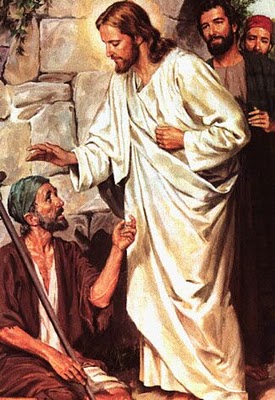Luke 5:12-26
Lesson 114
Lesson 114
Read both the "King James Bible" and the "New Living Translation."
In this lesson:
Leprosy and paralyses.
Leprosy and paralyses.
Jesus heals the leper.
Study Tip:
Remember to click on the links for more information.
Remember to click on the links for more information.
Who were the -
Pharisees -
One of four Jewish religious sects, along with the Sadducees, Zealots, and Essenes. Pharisee is a Hebrew word meaning "the separated ones." They were a legalistic party of religious leaders who avoided anything non-Jewish to study and live by the Torah (the Mosaic Law). They strictly, but often hypocritically, kept the Law of Moses and the "tradition of the elders (Matthew 15:2). They were a dominant force in Jewish society, and all religious ceremonies, prayers, and sacrifices were performed according to their decrees. The Pharisees believed in God, the authority of the Scriptures, the resurrection of the dead (Daniel 12:2), angels, and spirits (Acts 23:8), but they placed their own religious rules above God's. They continually added more and more of their own burdensome religious dictates on their followers to the point where true faith in God was lost. They righty anticipated the Messiah's arrival but expected him to be a great military/political leader. The Pharisees were so caught up in following the minute details of Jewish law that when Christ arrived, they didn't recognize Him as the Savior. Even though they knew Jesus performed "many miracles" (John 11:47) and even witnessed some firsthand (Matthew 12:9-14; 21:14-15; Mark 3:1-6; Luke 5:24-26; 6:6-11; Luke 14:2-4). They were good at spinning the truth and finding fault in others. They considered themselves more devout than other Jews and fasted twice a week (Luke 18:10-12). Yet, few Pharisees were truly religious, and Jesus called them hypocrites on many occasions (Matthew15:7-8; 22:18; 23:23-35; Luke 12:1). Their jealousy, pride, and anger towards Jesus turned to hatred, and their hatred led them to call for the crucifixion of the very Messiah they had been waiting for. To rid themselves of Jesus, the anti-Roman Pharisees even "took counsel with their bitter foes and pro-Roman Herodians" (Mark 3:6). In Jesus' time, there were approximately six thousand Pharisees' in Palestine.
Doctors of the law -
"Teachers of the law," usually called scribes or "lawyers" (Matthew 22:35; Luke 7:30; 10:25). Scribes were experts on Mosaic Law and the Old Testament prophecies. Predominantly Pharisees (one of four Jewish sects), they interpreted Mosaic Law, taught Judaism, and helped settle religious disputes. They were highly regarded in Jewish society, to the point where "If a man's father and teacher have lost anything, the teacher's loss should have the precedence - i.e., he must first be assisted in recovering it - the burden of a teacher is to be born in preference to that of a father, a teacher must be ransomed from captivity before one's own father." (From "Unger's Bible Dictionary" by Merrill F. Unger, published by Moody Press, Chicago, Illinois; page 981). Because scribes hindered people in their religious journey, burdened them with unnecessary religious legalisms, and tried to entrap Jesus (Luke 11:52-54), He condemned them as hypocrites (Luke 11:44).
Pharisees -
One of four Jewish religious sects, along with the Sadducees, Zealots, and Essenes. Pharisee is a Hebrew word meaning "the separated ones." They were a legalistic party of religious leaders who avoided anything non-Jewish to study and live by the Torah (the Mosaic Law). They strictly, but often hypocritically, kept the Law of Moses and the "tradition of the elders (Matthew 15:2). They were a dominant force in Jewish society, and all religious ceremonies, prayers, and sacrifices were performed according to their decrees. The Pharisees believed in God, the authority of the Scriptures, the resurrection of the dead (Daniel 12:2), angels, and spirits (Acts 23:8), but they placed their own religious rules above God's. They continually added more and more of their own burdensome religious dictates on their followers to the point where true faith in God was lost. They righty anticipated the Messiah's arrival but expected him to be a great military/political leader. The Pharisees were so caught up in following the minute details of Jewish law that when Christ arrived, they didn't recognize Him as the Savior. Even though they knew Jesus performed "many miracles" (John 11:47) and even witnessed some firsthand (Matthew 12:9-14; 21:14-15; Mark 3:1-6; Luke 5:24-26; 6:6-11; Luke 14:2-4). They were good at spinning the truth and finding fault in others. They considered themselves more devout than other Jews and fasted twice a week (Luke 18:10-12). Yet, few Pharisees were truly religious, and Jesus called them hypocrites on many occasions (Matthew15:7-8; 22:18; 23:23-35; Luke 12:1). Their jealousy, pride, and anger towards Jesus turned to hatred, and their hatred led them to call for the crucifixion of the very Messiah they had been waiting for. To rid themselves of Jesus, the anti-Roman Pharisees even "took counsel with their bitter foes and pro-Roman Herodians" (Mark 3:6). In Jesus' time, there were approximately six thousand Pharisees' in Palestine.
Doctors of the law -
"Teachers of the law," usually called scribes or "lawyers" (Matthew 22:35; Luke 7:30; 10:25). Scribes were experts on Mosaic Law and the Old Testament prophecies. Predominantly Pharisees (one of four Jewish sects), they interpreted Mosaic Law, taught Judaism, and helped settle religious disputes. They were highly regarded in Jewish society, to the point where "If a man's father and teacher have lost anything, the teacher's loss should have the precedence - i.e., he must first be assisted in recovering it - the burden of a teacher is to be born in preference to that of a father, a teacher must be ransomed from captivity before one's own father." (From "Unger's Bible Dictionary" by Merrill F. Unger, published by Moody Press, Chicago, Illinois; page 981). Because scribes hindered people in their religious journey, burdened them with unnecessary religious legalisms, and tried to entrap Jesus (Luke 11:52-54), He condemned them as hypocrites (Luke 11:44).




